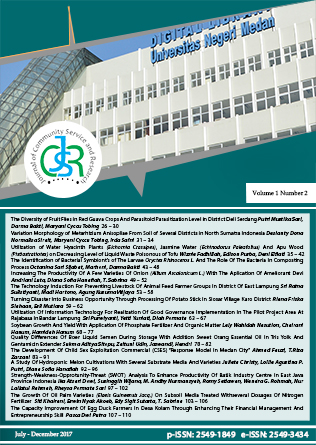UTILIZATION OF INFORMATION TECHNOLOGY FOR REALIZATION OF GOOD GOVERNANCE IMPLEMENTATION IN THE PILOT PROJECT AREA AT RAJABASA IN BANDAR LAMPUNG
DOI:
https://doi.org/10.24114/jcrs.v1i2.9339Abstract
AbstractImplementation of good governance™s principles at Rajabasa, Bandar Lampung has not done well. It caused by the lack of communication between government (public officials) and citizens. Therefore, the purpose of this public service activity is to resolve the problem by using information technology. The activity chooses a smaller government scope, which is a neighborhood area. The activity involves two steps, which is website creation and training step. The website contains are statistic data of citizens, procedures to apply the resident documents completing with the required forms, activities announcement, interactive forum for conveying critics and suggestions between citizens and government, and promotion forum for industry players. As a result, the website successfully displays a variety of information needed by citizens, and provides a means of communication for citizens and public officials. Training step about procedure for using the website also has been done. Certainly, evaluation about the liveliness of citizens in accessing the website is still required. However, good communication, efficiency, and effectiveness can begin to form well, which leads to better implementation of good governance.Keywords: good governance, information technology, public serviceDownloads
Published
2018-03-29
Issue
Section
Articles
License
Authors who publish with this journal agree to the following terms:
- Authors retain copyright and grant the journal right of first publication with the work simultaneously licensed under a Creative Commons Attribution License that allows others to share the work with an acknowledgment of the work's authorship and initial publication in this journal.
- Authors are able to enter into separate, additional contractual arrangements for the non-exclusive distribution of the journal's published version of the work (e.g., post it to an institutional repository or publish it in a book), with an acknowledgment of its initial publication in this journal.
- Authors are permitted and encouraged to post their work online (e.g., in institutional repositories or on their website) prior to and during the submission process, as it can lead to productive exchanges, as well as earlier and greater citation of published work (See The Effect of Open Access).
- This work is licensed under a Creative Commons Attribution-ShareAlike 4.0 International License.
This work is licensed under a Creative Commons Attribution-ShareAlike 4.0 International License.


